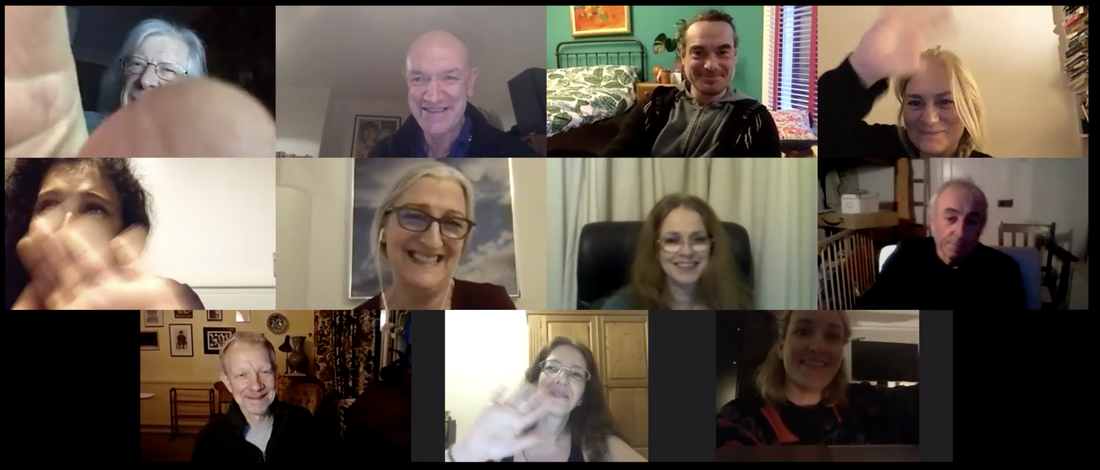|
January 29th 2021: Present (from top row, left: David Whitworth; Colin Ellwood; Rob Pomfret; Valerie Gogan; Sakuntala Ramanee; Susan Raasay; Julia Winwood; Kevin Mcmonagle; Jamie Newall; Emmanuela Lia; Emily Essery; Marta Kielkowicz (not pictured); Simon Usher (not pictured)
The first of two prophetic plays from either side of WW2, each offering a compelling social metaphor for their - and perhaps our - time. Here a Broadway 1939 epic: Maxwell Anderson's Key Largo, linking Fascism in (amongst other places) the Spanish Civil War to America's own tacitly accepted free-market gangsterism, represented as a small-time huckster and his gang who've hijacked an out-of-the-way Florida Keys hotel to run a gambling racket out of. Like fascism, this operation is shown as centring on a cult of personality, absolute commitment from underlings, and tacit acceptance by the authorities. Remind you of anything/anyone at all? In the play a jaded Spanish war turncoat has a chance to redeem himself by trading in the appeasement card and standing up to the domestic US ‘proto-fascists, but at the cost of his life. An astonishingly premonitory play for 1939, let alone from Broadway, and great to get a sense of the US playwriting generation slightly after O'Neill and Odetts and before Miller and Williams, especially through a play with such colourful, noir-ish roles, if a little marinated in earnest sermonising. Maxwell Anderson also worked with Kurt Weill on September Song and whose work was also the original source of lots of British Elizabethan historical film dramas such as Fire Over England with Betty Davis. Extraordinary that this (free)-verse play lasted on Broadway in 1939 for over a hundred performances. Paul Muni and Uta Haagen took the two leads. The play was subsequently rather brutally adapted, in effect used as no more than raw material, for John Huston’s 1949 film of the same name with Bogart, Bacall and Edward G Robinson. The play takes itself very seriously, with extended speeches lamenting the death of god and the meaninglessness of the universe, all of which now feels very much like last century’s news. If the music of the piece seems at times bloated, and the pace a little waterlogged, the treatment of the Sidney Carlton-like redemption story at its centre doesn't help. It seems flat, over-explained, over-emphatic and psychologically inert and one-note. ‘King’ is the American Spanish Civil War veteran visiting the bereaved families of his comrades whom he abandoned in the field when it looked like they were on the point of being overrun by the fascists. He had been their leader and inspiration for travelling to Spain in the first place and now offers them the chance to walk away from the fighting, knowing that death was otherwise imminent and overall defeat by the fascists in any case certain. They stay on the basis that commitment to a cause – even a lost one – gives life meaning in a godless world. This episode is the play’s extended prelude, realised with a rather beautifully poignant and lyrical atmosphere. Back in the States, King becomes a bit of a hobo visiting his ex-buddies’ scattered families in an attempt at a kind of (unspecified) atonement. The last of these is to the most important to him: the sister and blind father of his erstwhile best friend ‘Victor’. If King stands up to the gangsters who've taken over their hotel, he potentially redeems himself for his Spanish ‘betrayal’. In perhaps the oddest and strangely over-emphatic plot-point, he confesses to his dead friend’s father and sister that not only did he leave his companions, but subsequently blended into and even joined the fascists in order to save his own life. As we see him King appears pathetic, guileless, depressive and generally woeful. Yet surely with a little more positivity and making more of internal contradictions this could be a really fascinating and ambiguous character. And overall this plot vector makes a fascinating link between European fascism and gangster capitalism in the US. Of course, King ultimately does stand up to the gangsters, making the ultimate sacrifice and as a result being symbolically recognised by the family as the reincarnation of their ‘son’. The gangsters are brought vividly to life by Anderson and there is some classy melodrama and emblematic plotting. And in its perceptions about the political implications of appeasement and amoral capitalism supported and sustained by a facilitating local civic regime (and strange pre-echoes of the recently ejected 45th president’s behaviours and risks) it is very telling indeed. If only it didn’t explain itself at such length, and if the psychology of King wasn’t quite so flat and miserable…But it feels that some very targeted corrective surgery by a good playwright excising the windy philosophising and tightening the screw of King's mojo might make this fascinating play very serviceable. And wonderful to hear the context for the later and livelier and more compact and punchy flourishing of Miller and Williams. The reading was inevitably long, but with some really rich and characterful voicings, especially of the gangsters. The gangster elements had slightly the feel of translations of Brecht’s Jungle of the Cities.
0 Comments
Leave a Reply. |
INDEX of dates:
INDEX of playwrights and plays:
INDEX of contributors:
|

 RSS Feed
RSS Feed
